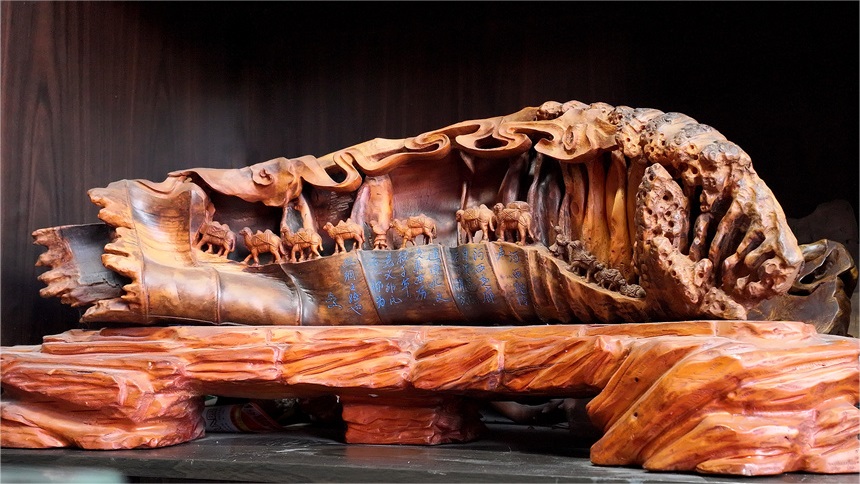Key anti-graft campaign bearing fruit
China is continuously improving the legal framework and strengthening international cooperation to advance the work of preventing the escape of corruption suspects, pursuing fugitives, recovering stolen assets and improving the cross-border corruption governance system, experts said.
The Ministry of Public Security recently launched the Fox Hunt 2024 operation targeting economic crime suspects who have fled abroad, instructing public security organs to intensify efforts in key cases and to expand law enforcement cooperation channels.
Since 2014, about 9,000 economic crime suspects have been captured and handed over to China from more than 120 countries and regions via the Fox Hunt operation, leading to the recovery of about 49 billion yuan ($6.77 billion) in assets.
The operation is part of the Sky Net campaign initiated in 2015 by the Fugitive Repatriation and Asset Recovery Office of the Central Anti-Corruption Coordination Group. The campaign targets fugitives facing corruption charges.
This year's Sky Net campaign was launched in March. It aims to maintain a high-pressure stance on fugitive repatriation and asset recovery, deepen cross-border corruption governance, and promote an integrated mechanism for preventing escapes, pursuing fugitives and recovering assets.
Ji Yaping, head of the School of Administrative Law at Northwest University of Political Science and Law, emphasized that to eradicate the breeding grounds for corruption, it is crucial to intensify efforts to combat corruption domestically and tighten the network for tracing and apprehending fugitives, leaving no room for escape.
"The dual emphasis on preventing escape, pursuing fugitives and recovering illicit assets, as well as governing cross-border corruption, could dispel the notion among potentially corrupt individuals that they can evade punishment by fleeing," he said.
All the departments involved in Sky Net were urged to coordinate international and domestic efforts to advance the pursuit of fugitives and the recovery of assets, strengthen anti-corruption efforts among countries involved in the Belt and Road Initiative, and maintain a high-pressure stance on anti-corruption.
The communique from the Third Plenary Session of the 20th Central Commission for Discipline Inspection of the Communist Party of China in January highlighted the need to focus on addressing cross-border corruption issues. According to the CCDI, Sky Net 2023 successfully repatriated 1,624 fugitives, with the number of newly escaped individuals remaining at a low level.
Resolute will
Ji Ying, an associate professor of law at the University of International Business and Economics in Beijing, noted that this year marks the 10th year of the Sky Net campaign, with consistent efforts to pursue fugitives and recover illicit assets abroad demonstrating China's resolute will to combat corruption.
"In current corruption cases, foreign-related factors are increasingly prominent, and some cases are old with long time spans and few effective leads, urgently requiring deeper international cooperation," she said.
Challenges such as criminals' money laundering activities, the complex financial systems of different countries, and the inadequate enforcement of anti-money laundering regulations complicate the process of recovering corrupt assets, she added. Furthermore, the high cost of asset recovery and the attitude of the country where the assets are located also affect the recovery process.
Moreover, most countries with which China has signed extradition treaties are developing nations. However, the primary destinations for Chinese fugitives, such as the United States, Canada and Australia, lack effective bilateral extradition treaties with China, increasing difficulties in effective extradition cooperation with these countries, she said.
Legislative improvement
Ji noted that China has continuously improved its legislation and mechanisms related to anti-graft to tackle these challenges and adapt to new needs.
As of October, China had signed 171 bilateral judicial assistance treaties with 83 countries and joined nearly 30 international conventions that include judicial assistance and extradition, with cooperation spanning over 130 countries.
In June 2014, the Fugitive Repatriation and Asset Recovery Office of the Central Anti-Corruption Coordination Group were established, followed by the establishment of similar offices at the provincial level in 31 provinces, autonomous regions and municipalities.
In March 2018, supervisory commissions were fully established at the national, provincial, municipal and county levels, and the Supervision Law was enacted, specifically outlining provisions for international anti-corruption cooperation.
In October 2018, China introduced the law on international criminal judicial assistance and amended the Criminal Procedure Law to include procedures for trials in absentia. In 2020, an amendment to the Criminal Law was approved regarding the crime of money laundering.
In July last year, the Law on Foreign Relations was enacted. It emphasized deepening mechanisms for international law enforcement cooperation and improving judicial assistance systems. In addition, the Anti-Money Laundering Law is being amended.
New characteristics
Li Xiao'ou, an associate professor of law at UIBE, noted that current corruption cases also exhibit new characteristics linked to the internet, such as new cross-border money laundering methods and virtual currency laundering. International cooperation on cross-border evidence collection and the rising difficulty in investigating digital crimes continue to pose challenges.
Apart from enhancing judicial cooperation with foreign countries, more research and legislation regarding international laws, especially to address conflicts between Chinese laws and the laws of foreign countries where corrupt individuals are located, should be conducted, Li said.
The United Nations Convention Against Corruption provides a basic framework for the pursuit of fugitives and for asset recovery, but substantial differences in culture, values and legal systems among countries still require intensified efforts for successful cross-border pursuits and asset recovery, Li said.
China has joined the UNCAC, and its domestic laws need further alignment with the convention, while the mechanisms for cross-border pursuit of fugitives and asset recovery require thorough implementation, Li added.
As the efforts intensified in pursuing fugitives and recovering illicit assets, many fugitives abroad have voluntarily surrendered. Vigorous pursuit of fugitives is an effective way to prevent them from fleeing abroad, and the expanding achievements in fugitive repatriation have a powerful deterrent effect, she said.
Photos
Related Stories
- Former head coach of China national men's football team stands trial on multiple bribery charges
- Fugitive duty crime suspect repatriated to China
- 3 sports executives in China found guilty of bribery
- Former vice head of Chinese Football Association stands trial for bribery
- CPC advances discipline education campaign
- Former senior municipal legislator of China's Shenyang stands trial for bribery
Copyright © 2024 People's Daily Online. All Rights Reserved.









